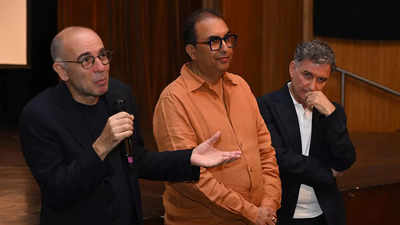
Giuseppe Tornatore with Shivendra Singh Dungarpur, founder of the Film Heritage Foundation and Andrea Anastasio, director of the Italian Cultural Institute in Delhi Giuseppe Tornatore 's sentimental film Cinema Paradiso (1989) made its way to select screens in Delhi and Mumbai this week as the director visited the country at the invitation of the Film Heritage Foundation and the Istituto Italiano di Cultura di Mumbai. After sharing anecdotes about the film with cinephiles in Mumbai and engaging with students, filmmakers, and movie lovers, Tornatore received an invitation from Andrea Anastasio, director of the Italian Cultural Institute in Delhi, for another screening - an invite he couldn’t refuse. Giuseppe Tornatore at IHC Last Monday, as the film was set to be screened at the India Habitat Centre in Delhi, Tornatore and Anastasio arrived well before showtime.
To their surprise, movie buffs had already been queuing for hours, eager to watch the classic. Several film enthusiasts mentioned they’d come with the slight hope of getting in, thinking it worth the effort even if a seat was unlikely. The Stein auditorium at the IHC filled up within minutes, but an equal number of hopeful movie buffs lingered outside, still wishing for entry.
Shivendra Singh Dungarpur, filmmaker and founder of the Film Heritage Foundation, suggested,"I saw many sitting outside. Let’s make it like Cinema Paradiso. Let them come in and sit in the aisles.
After all, we have the maestro himself, just as he showed in the film." However, safety regulations dashed the hopes of hundreds as entry was ultimately denied. 'Watching the same film on a tablet and in a theatre makes it feel like a different film' As audiences interacted with Tornatore at the screening, questions ranged from whether returning home might be the only path to closure with the past to inquiries about the significance of a scene set against the ocean, its symbolism, the quest for meaning in life, and if the film was autobiographical.
Introducing the film to the audience, Giuseppe Tornatore said,"It's unusual to go and introduce the film after 40 years to the audience and be in movie theatres like these with so many people. It's really strange; I don't know how to explain it. When I made the film, I could never have imagined something like this could happen.
Watching a movie on a tablet and in a theatre is a different experience. The movie is not the same. On a tablet, it's one movie, and in a theatre, it’s a different movie.
" He explained that despite crises around the world, cinema has survived because people still want to watch films. He continued, "Despite the number of movie theaters decreasing over the years, the number of people who watch movies is increasing day by day. We're forced to make movies because people want to see them.
" Shivendra Singh Dungarpur, filmmaker and founder of the Film Heritage Foundation with Andrea Anastasio, director of the Italian Cultural Institute in Delhi ' I don't believe in the death of cinema, it's impossible' Cinema Paradiso is a nostalgic celebration of the power of not just films but cinema as a communal experience. An attendee asked that when the film first came out, was it considered a swan song for moviegoing - and now, over 35 years later, as Tornatore is still showing the film in theaters, what does he think about the death of cinemas? Tornatore replied, "My answer is very simple - I don't believe in the death of cinema. It's impossible.
I can give you a very simple reason - despite the crisis, the number of movie theaters is always decreasing, and despite this, the number of people who go to see movies is getting bigger day by day. So, we're forced to make movies because people want to see them. What's changing? The only thing that is changing is the way people see movies.
" He added, "In the last 4-5 days that I stayed in India, probably 90% of the young people I met told me, 'I'm a filmmaker, I'm a filmmaker.' All these young people are filmmakers. What does this mean? It means that the language of movies is becoming like the language of writing.
Anybody can write. And today, everybody can make a movie (on their phone) if they have a story to tell." Andrea Anastasio, director of the Italian Cultural Institute in Delhi said,"We immediately collaborated not just because we had the director, but also, and mainly because watching a restored copy of a film is a rare opportunity.
It's not just a celebration of a wonderful film that brings cinema, life, and history together in a universal way, but also because restoring films means caring for future generations." Movie buffs queued for hours to attend the screening When The Sound of Music director reviewed Cinema Paradiso Cinema Paradiso exists in two versions, and when asked if the shorter version is the director's cut, he quipped, "I'm the director. Both versions are mine.
" He then shared an anecdote - when he went to LA for the first time for a screening of the shorter version of the film, The Sound of Music director Robert Wise introduced himself and discussed the film. Tornatore recalled, "I was shivering. He was a big director, and he gave me a lot of compliments.
But then he said, 'I have only one critique of your film. If I were in your shoes, when Toto (the central character) comes back to his village, I'd make him meet the girl he loved." This scene was part of the longer version of the film, but Tornatore had removed it.
He told Wise, "You're probably right. But I didn’t think about it that way." He told the audience,"At that moment, for us (Tornatore and the producer), it felt like a mistake, and we felt like hiding it.
It was normal - many films start with a longer version. So, if the story works, it will work even after your manipulation, as long as you manipulate it well." Tornatore recalled,"In my village, one of the projectionists was working in the church, and the priest used to watch the film first himself (to cut the kissing scenes).
The legend in my village was that a young altar boy used to watch those scenes, but nobody else saw the kisses (as they were cut from the film).” There’s an entire sequence in the film where a priest is censoring films, and in another scene, an audience member shouts, “I haven’t seen a kiss in 12 years, and we never will.” He said,"My first job was as a photographer.
My maestro was both a photographer and a projectionist, and he gave me the opportunity to learn. I was 10 years old when I started. I tried to imitate him as he would go around the village taking photos and observing people's movements.
Knowing real life is necessary - even if you're shooting a fantasy movie, you need to know people's behaviour. That's important." Cinema Paradiso was a hit at the 1989 Cannes International Film Festival, and won the special jury prize.
It also won the Golden Globe and the Academy Award for best foreign film..










